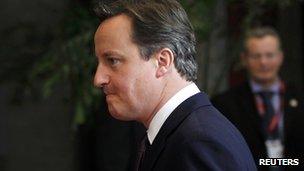Euro crisis summit: The night Europe changed
- Published
- comments

British Prime Minister David Cameron spent the night in negotiations in Brussels
In the long hours of a bitter Brussels night Europe changed.
A major step was taken towards closer integration. It was not as a result of popular demand by Europe's people. It came about because Europe's leaders believed their project had "never been in such danger".
Last night most of Europe's governments gave up a chunk of their sovereignty. In the future, tax and spending plans will be shown to European officials before national governments.
There will be automatic sanctions against those countries that overspend. A monetary union has moved towards being also a fiscal union.
As a result of the late-night negotiations, there is now a two-speed Europe. French President Nicolas Sarkozy accepted that. He said it was "the responsibility of those who opted out of the single currency".
Several countries outside the eurozone had argued passionately against a Europe of the "ins" and "outs", of two categories of membership. That, however, is what happened.
Europe's leaders failed to agree a change to the EU treaties. Instead the new rules will be adopted and implemented through an inter-governmental treaty.
This will be an agreement involving the 17 members of the eurozone and some other states that are willing to embrace the new rules.
British isolation
The main obstacle to treaty change was Britain. Never has the UK been more isolated in Europe.
David Cameron has antagonised many European leaders. In their view he used his veto at a time of Europe's hour of need.
If there was to be a treaty change, the Prime Minister wanted exemptions from some financial regulations but Germany and France would not budge.
In particular, President Sarkozy was determined that there be no waiver for the UK. In his view it would undermine a lot of the work to regulate the financial sector.
The French have long believed that part of the reason for the eurozone crisis can be laid at the door of a poorly regulated financial services sector. There were few voices prepared to defend the City of London.
In the end, David Cameron concluded that agreeing to a change to the EU treaties would be against British interests.
His priority was to protect Britain's financial sector and the single market, which he regards as one of the principal benefits of belonging to the EU.
Closer than planned
The arguments are not yet over. A significant question is whether European institutions can be used to implement what is an inter-governmental treaty.
The French and the Germans would like to see the European Commission and the European Court of Justice involved in enforcing and overseeing these new rules.
As far as the British are concerned, the EU institutions cannot have any formal role in an agreement outside the treaties.
If EU officials are in the room, the UK will expect to be involved. David Cameron has already issued a warning - the EU belongs to the European Union as a whole. This is a recipe for further tussles and fights.
An inter-governmental treaty will be quicker to implement than a full treaty change. It will not require such extensive ratification. However it may also prove less rigorous.
Even so, the main impact of these changes will be in the long term.
Last night's historic agreement has little to say about debt, about the absence of growth, about the European economies that continue to grow apart.
The major test will be whether a commitment to budgetary discipline frees up the European Central Bank to act more aggressively in the markets and so lower the borrowing costs of troubled countries like Italy and Spain.
The head of the ECB, Mario Draghi, was circumspect last night, saying only that the agreement was "going to be the basis for a good fiscal compact and more discipline".
For the UK this marks a fundamental change in its relationship with Europe. Never has the UK been so on the margins.
If the eurozone collapses, of course, Britain may find others rallying to its vision. At home there will be those who argue that if Britain is so marginalised it might as well go further and decide whether it wants to stay in the European Union. The cry for a fundamental re-think of Britain's relationship with Europe will not be stifled.
For the European people, they are in a closer Europe than they ever voted for. But Jean Monnet, one of the founders of the EU, external, said Europe would be forged in a crisis. It has been proved so yet again.